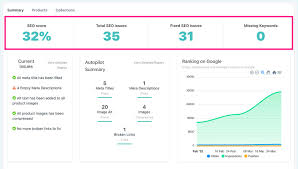
Shopify is a powerful e-commerce platform that enables businesses to create online stores with ease. However, having a great Shopify store is only half the battle; the other half is ensuring that your store is easily discoverable by potential customers. This is where Search Engine Optimization (SEO) comes into play.
SEO is crucial for driving organic traffic to your Shopify store. By optimising your site for search engines, you increase the chances of your products being found by people searching for them online. This can lead to higher visibility, increased website traffic, and ultimately more sales.
Here are some key strategies to boost the SEO performance of your Shopify store:
Shopify offers a range of apps that can help streamline your SEO efforts. From keyword research tools to image optimisation apps, these tools can assist you in implementing best practices and monitoring the performance of your SEO strategies.
In today’s competitive e-commerce landscape, effective SEO can make all the difference in driving traffic and boosting sales for your Shopify store. By implementing these SEO strategies and utilising available tools and resources, you can position your online business for success in the digital marketplace.
By utilising Shopify SEO, you can enhance your store’s online visibility significantly. By improving your search engine rankings through effective SEO strategies, potential customers are more likely to discover your store when searching online. This increased online visibility not only drives more traffic to your Shopify store but also boosts the chances of converting those visitors into loyal customers.
By optimising your Shopify store for SEO, you can experience the significant benefit of higher website traffic. Implementing SEO strategies can attract more organic traffic to your online store, ultimately resulting in increased visits from potential customers. This boost in traffic not only enhances the visibility of your products and services but also creates more opportunities for conversions and sales.
By implementing SEO best practices on Shopify, such as ensuring mobile responsiveness and fast loading times, businesses can enhance the user experience for their customers. These improvements not only contribute to higher search engine rankings but also lead to a more seamless and enjoyable browsing experience. A website that is easy to navigate, loads quickly, and adapts well to different devices can significantly impact user satisfaction and ultimately drive more conversions. Shopify SEO plays a crucial role in not just attracting visitors but in providing them with a positive interaction that can result in increased engagement and sales.
By utilising effective SEO strategies on Shopify, businesses can benefit from targeted audience reach. By focusing on specific keywords and demographics, businesses can tailor their online presence to attract the right audience for their products or services. This targeted approach increases the likelihood of reaching potential customers who are actively searching for what the business offers, ultimately leading to higher engagement and conversion rates.
When it comes to the advantages of Shopify SEO, one notable benefit is its cost-effectiveness. In contrast to traditional advertising methods, such as print or TV ads, investing in Shopify SEO can yield long-term benefits without the hefty price tag. By optimising your online store for search engines, you can attract organic traffic and improve your website’s visibility over time, all at a relatively low cost. This makes Shopify SEO a smart and sustainable marketing strategy for businesses looking to maximise their online presence without breaking the bank.
One notable drawback of Shopify’s SEO functionality is its limited customisation options. Unlike self-hosted platforms, Shopify may restrict the implementation of certain advanced SEO strategies due to its predefined structure. This limitation can hinder the ability to tailor SEO efforts extensively to meet specific business needs or target niche markets effectively. Businesses seeking highly customised SEO solutions may find Shopify’s constraints in this area challenging when aiming for more intricate optimisation techniques and strategies.
Dependency on Apps can be a significant drawback when it comes to Shopify SEO. While Shopify provides a range of apps designed to boost SEO performance, becoming overly reliant on third-party apps can introduce complexities and extra expenses to your online store. Relying too heavily on these external tools may not only increase the overall cost of maintaining your store but also add layers of dependencies that could potentially impact the efficiency and long-term sustainability of your SEO strategies. It’s essential to strike a balance between utilising helpful apps and ensuring that your SEO efforts remain streamlined and cost-effective in the long run.
One significant drawback of utilising SEO on Shopify is the presence of technical limitations. Certain crucial technical aspects of SEO, like making modifications to robots.txt files or incorporating advanced schema markup, can prove to be challenging or even restricted within the Shopify platform. These limitations may hinder the full optimisation potential of a website, potentially impacting its search engine visibility and overall performance in organic search results. It is essential for Shopify users to be aware of these constraints and explore alternative solutions or workarounds to address such technical challenges effectively.
In the realm of Shopify SEO, one significant drawback is the fierce competition that arises from the platform’s widespread popularity. With numerous online stores utilising similar themes and structures on Shopify, standing out in search engine results becomes increasingly challenging. Without distinctive optimisation efforts tailored to set your store apart, it can be a daunting task to capture the attention of potential customers amidst the sea of similar-looking websites.